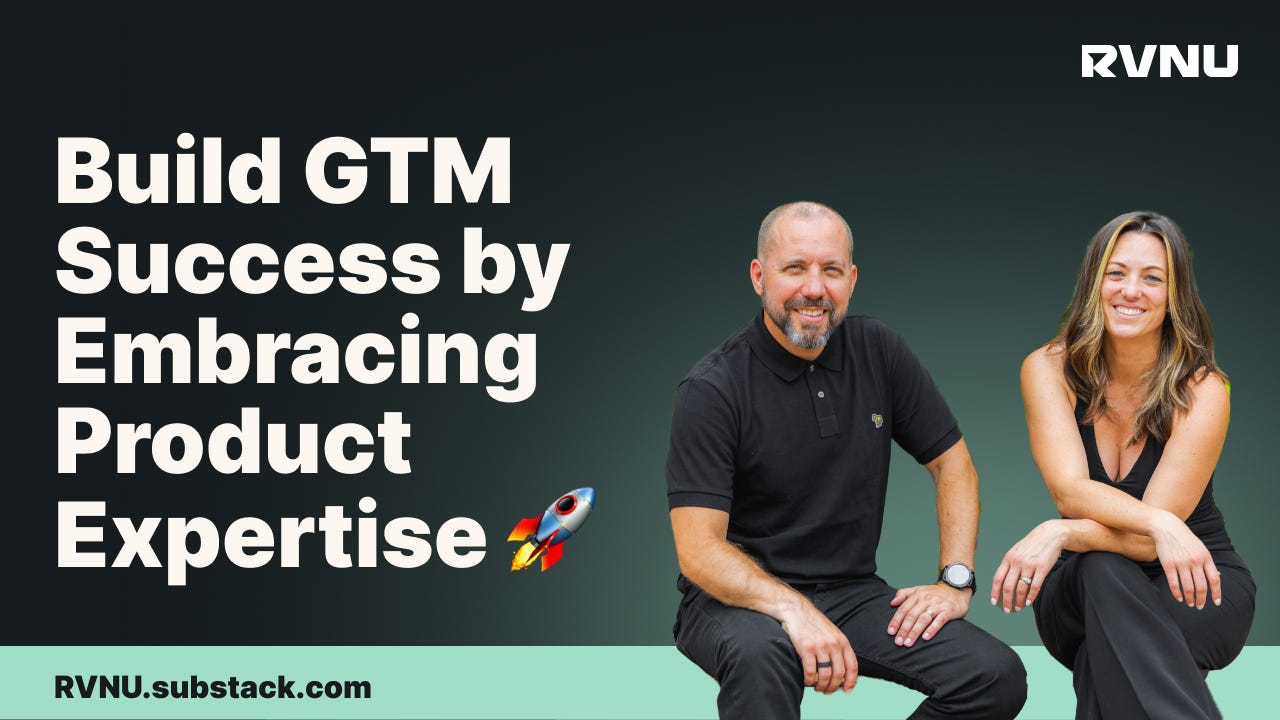RVNU #019: How to Build GTM Success by Embracing Product Expertise
3 key takeaways from a discussion with Cornell lecturer and product expert, Keith Cowing.
Hi folks,
This week, I’m taking a different approach. Ahead of our upcoming RVNU product launches, I sat down with Keith Cowing for a deep dive into the intersection of product and go-to-market (GTM) strategies in early-stage startups. This intersection is one of the most overlooked yet critical aspects of scaling effectively—a topic we’ll explore extensively in the soon-to-launch RVNU podcast.
Why Product & Sales Alignment Matters More Than You Think
In early-stage startups, the relationship between sales and product is everything. It’s more critical than marketing or customer success. Yet, few on either side fully appreciate this dynamic. Keith and I unpacked this idea in the podcast, sharing insights that I believe can radically improve your GTM outcomes.
Meet Keith Cowing
Keith is an exited founder and a product leader with a resume that includes LinkedIn, Twitter, and Flatiron Health. Today, he coaches CEOs and product teams while teaching product management at Cornell. He also incorporates the RVNU framework in his coaching, using it to anchor conversations around strengths, gaps, and priorities.
Here are the key takeaways from our conversation—practical insights you can apply today. If you’re short on time, you can jump straight into the full podcast episode on YouTube, Spotify, or Apple Podcasts.
Want to tackle your GTM challenges right away? Take RVNU’s free Go-to-Market Assessment.
1. Aligning Product & Sales Priorities Is Non-Negotiable
Most founders have grand plans but skip over the foundational work needed to align product and sales priorities. This lack of alignment causes missed opportunities and wasted resources.
At RVNU, we speak with hundreds of founders every year, and the single most valuable asset we offer is the RVNU framework. It’s a visual tool that forces teams to reflect on their priorities in a structured and constructive way, aligning everyone—from VCs to founders to their teams.
Keith and I also discussed how founders under pressure from VCs can use frameworks like RVNU to create clarity and focus, saving weeks of work and hundreds of thousands of dollars in missteps.
💡 Takeaway: Make product-sales alignment your first GTM priority. Use frameworks to anchor discussions and avoid costly inefficiencies.
2. Product Expertise: A Rare Superpower in Sales
Most sales organizations train reps to memorize scripts, not master products. This leads to:
• Inefficient sales processes.
• Reliance on sales engineers or product teams to close deals.
• Pipeline delays and unnecessary pressure on other departments.
Founders need to rethink this approach by:
• Setting a high bar for product expertise: Reps should know the product deeply, be able to address edge cases, and suggest creative workarounds without pressuring product teams to build new features prematurely.
• Empowering reps to reject bad deals: Reps must feel confident disqualifying prospects who don’t fit the ICP (ideal customer profile) without fear of repercussions. Closing non-ICP customers undermines long-term growth and damages team culture.
💡 Takeaway: Invest in product training for your sales team. Sales reps who understand the product deeply can consult effectively, drive velocity, and avoid setting false expectations.
3. Sales Incentives Should Reflect Long-Term Value
Incentivizing sales reps solely on deal closure is a recipe for churn and inefficiency. Keith and I discussed how tying part of a rep’s commission to post-sale metrics, like high-value product usage by key personas, creates a healthier GTM culture.
This approach aligns incentives across the organization, from product to marketing to customer success. It ensures that deals closed are valuable, sustainable, and contribute to long-term success.
💡 Takeaway: Adjust compensation plans to include downstream indicators of success. This encourages reps to prioritize deals that align with ICP and value delivery.
What’s Next?
This podcast discussion gave me a lot of food for thought as we prepare for the RVNU podcast launch. If you’re as fascinated by the product-GTM dynamic as we are, I’d love to hear your thoughts or get you on the show.
Quick Action Items:
1. Listen to the full conversation with Keith on YouTube, Spotify, or Apple Podcasts.
2. Take our free Go-to-Market Assessment to pinpoint areas where your team can improve alignment.
3. Book a free coaching session with Keith
4. Share this newsletter with a founder or revenue leader who could benefit from these insights.
Thanks for reading, and happy building!
Wayne




Really interesting take on how product expertise can transform sales teams. The point about tying sales incentives to long term value makes so much sense. What’s your view on balancing speed vs quality in early stage GTM strategies? And how do you think smaller startups can build product savvy sales teams without huge resources?